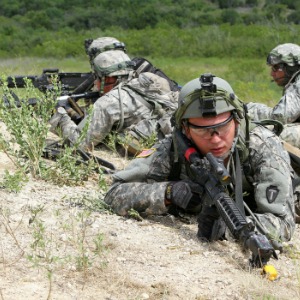Exportable Combat Training Capability 16-5
Story by: Sgt. Michael Vanpool and Sgt. 1st Class Thomas Wheeler
Posted: Aug. 26, 2016
 Soldiers with Company A, 2nd Battalion, 42nd Infantry Regiment, 56th Infantry Brigade Combat Team, look out from their attack positions behind a hill during a dismounted platoon attack lane at Fort Hood, Aug. 14. The brigade’s annual training, the Exportable Combat Training Capability program, allowed platoons to complete lanes and then to recap their performance during an instrumented after action review. (U.S. Army National Guard photo by Sgt. Michael Vanpool)
Soldiers with Company A, 2nd Battalion, 42nd Infantry Regiment, 56th Infantry Brigade Combat Team, look out from their attack positions behind a hill during a dismounted platoon attack lane at Fort Hood, Aug. 14. The brigade’s annual training, the Exportable Combat Training Capability program, allowed platoons to complete lanes and then to recap their performance during an instrumented after action review. (U.S. Army National Guard photo by Sgt. Michael Vanpool)
FORT HOOD, Texas - Nearly 2,600 soldiers from the Texas Army National Guard’s 56th Infantry Brigade Combat Team, 36th Infantry Division, descended on Fort Hood for the Exportable Combat Training Capability program 16-5, Aug. 6-26.
The xCTC program is an Army National Guard brigade held training exercise designed to certify combat proficiency at the platoon level with support from First Army.
“The purpose of an xCTC is to train a National Guard BCT’s platoons to proficiency,” said Col. Jim Isenhower, commander, 189th Combined Arms Training Brigade, First Army (Division West).
The 56th includes infantry, scout, and artillery units. In addition medical, engineer, signal,and several support platoons comprise the brigade.
“Each of their platoons have very different missions and our job is to help them train to proficiency during their ready-year 3,” he added.
With support from nearly 300 Observer/Coach, Trainers (O/CTs) of the 189th Combined Arms Training Brigade based out of Joint Base Lewis-McChord, Washington, the Guardsman tackled multiple training lanes ranging from vehicle recovery and platoon defensive operations to mass casualty and route clearance procedures.
Each lane conducted multiple iterations following a crawl- walk-run strategy and was followed by an interactive after action review that ensured each participating platoon identified their deficiencies and applied those lessons learned to future repetitions.
“It’s been the best training I’ve seen in years,” said Col. David Webb, commander of the 56th IBCT for the past two years. “It’s shown me where our weaknesses are and what we need to work on in training-year 17.”
The multi-faceted brigade is spread across several hundred miles of the north, central, east and west regions of Texas. Annual training allows the brigade to work as one cohesive unit.
“The reality of the training far exceeded anything we could do on a drill weekend and with the OPFOR, and xCTC effects, there’s no hiding, your readiness is right there in black and white. Because of it we are phenomenally better then when we started on day one,” Webb added.
Capt. Joanna Van Engel, commander for Headquarters and Headquarters Company, 949th Brigade Support Battalion, 56th IBCT, agreed with Webb about the training value and importance and stressed its role in increasing her unit’s readiness.
“It increased our readiness because when my Soldiers get realistic, real-world training they learn how to react as a team and that cohesiveness translates to a combat environment,” Van Engel said. “It also gives us the validation that we need that our troops can perform in a combat situation and it gives them confidence in themselves and each other.”
Van Engel and Webb both went on to attribute much of their unit’s success during the exercise to the 189th CATB OC/T support.
“I really appreciate what the OC/Ts did to create realistic training,” Van Engel said. “They gave us some very valuable guidance and were able to observe my troops from aspects that I can’t always get to. They really served as my eyes and ears.”
Following each lane iteration, the platoons gathered with the OC/Ts to have an interactive after action review. Notes were augmented with two and three- dimensional troop movements, as well as video recordings.
“Their method was to come out here, support us, and make us better and they helped us to be successful,” Webb added.
The Guardsmen and women were not graded, but given a benchmark. They were then trained and coached to improvement and proficiency.
“We are indebted to them for all of their help and mentorship and honest evaluation. The 189 just basically never said no. They facilitated anything that I asked them to. It’s been the best OC/T experience I’ve had, and I’ve had several.”
Since its first rotation held in 2005, the xCTC program has been designed to provide tough, realistic training for participating brigades as well as methods for achieving company level and battalion battle staff proficiency for ARNG units during pre- mobilization training.
The exercise also satisfies requirements for possible participation in future Combat Training Center rotations at the Joint Readiness Training Center at Fort Polk, Louisiana, or the National Training Center at Fort Irwin, California.